TORONTO, Canada – The governments of Canada and Ontario are investing up to $10.21 million through the Canadian Agricultural Partnership (the Partnership) to help the agri-food sector adopt on-farm solutions and best practices that will grow their business, create jobs and drive economic growth across Ontario while continuing to provide the safe, high-quality food the province is known for.
“We are committed to helping farmers with strategic on-farm investments that improve their bottom line and generate sustainable economic growth,” said Marie-Claude Bibeau, federal minister of agriculture and agri-food. “These cost-shared investments will not only build a stronger, more innovative agriculture sector in Ontario but support the prosperity of rural communities across the province.”
This investment provides much-needed support to help the farmers who have worked tirelessly to feed millions of Canadians throughout the pandemic become more sustainable and competitive. Farmers and other businesses can use the funding to improve their operations, food safety and animal health, develop new products and processes and access new markets. Farmers and other businesses can apply for the program starting on November 15, 2021, until December 6, 2021.
“Our government is investing in these projects to help farmers and other businesses adopt innovative solutions that help increase their productivity in the agri-food sector,” said the Honourable Lisa Thompson, provincial minister of agriculture, food and rural affairs. “When we invest in the agri-food sector, we’re supporting the industry in creating good jobs and economic growth, which strengthens Ontario’s economy.”
[Today’s] announcement builds on the supports available in the past year to help farmers including:
- An investment of $7.3 million to support farmers and other agri-food businesses through the Partnership which closed in January 2021.
- A $22 million investment to increase the adoption of technological innovations within the agri-food sector to enhance the health and safety of workers and improve the sector’s efficiency and productivity through the Agri-Tech Innovation Program.
- An investment of up to $5 million in emergency drought support for livestock farmers in Northwestern Ontario in addition to $2 million to cover immediate needs like feed, water and fencing.
- An additional investment of up to $15,000 per eligible farms for permanent water projects in northwestern Ontario.
“The Ontario Soil and Crop Improvement Association is very pleased to be delivering the next intake for the Partnership program. The opportunities under this new intake will support our province’s resilient farmers in innovating and strengthening their operations while supporting the industry’s economic recovery,” said Chad Anderson, president of OSCIA. “The timing of the intake will provide plenty of opportunity for successful participants to get their project planning underway for next Spring.”
Since June 2018, both the federal and provincial governments have committed over $100 million in support to more than 5,000 projects through the Canadian Agricultural Partnership to help eligible Ontario farmers, processors, businesses and sector organizations innovate and grow.






